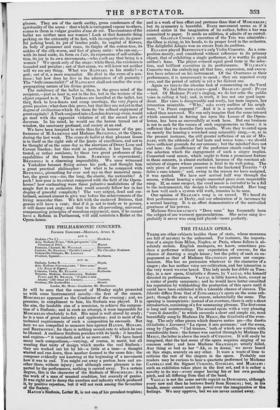THE PHILHARMONIC CONCERTS.
FOURTH CONCERT—MONDAY, APRIL a.
ACT I.
Sinfonia (No. I ) Moscheks. Aria, Madame Pout, Deh per (Flesh)," (La
Clemenza di Tito) Mozart. Fantasia, Clarinet, Mr. WILLMAN Baermantt. Cantata, Mr. BRAHAM, "David's Lament" The Cheralicr Neukomm.
Violoncello Obligato, Mr. LINDLEY.
Overture, Egmont Beethoven.
ACT
Sinfonia, Letter R Haydn. Aria, Madame STOCKHAUSEN, "Dove sono," (Le Noxze di Figaro) Mozart. Concerto, Violin, Mr. ELIASON Beethoven.
Terzetto, Madame STOCKHAUSEN, Madame Pozzi. and Mr. BRAMAN, "0 MCC e cam
istante,"(G/i Orazi ed i Curies° rimarosa.
Overture, Die Zauberthite Mozart. Leader, Mr. Molex—Conductor, Mr. MoscitErzs.
IT will be seen that the concert of Monday night presented us with some Instrumental novelty—the first of the season. MOSCHELES appeared as the Conductor of the evening ; and, we presume, in compliment to him, his Sinfonia was played. It is the aim, the laudable aim of a musician, to achieve the composi- tion of a Sinfonia; and in such an attempt, it were impossible for MOSCHELES absolutely to fail. His mind is well stored by study; he is a man of great industry and application; and in most of the technical requirements of such a composition he succeeds. But here we are compelled to measure him against HA.YDN, MOZART, and BEETHOVEN' for there is nothing second-rate to which he can be likened. A mediocre Sinfonia perishes with its birth: it breathes and expires—" it vanisheth and is no more seen." We have heard many such compositions,—varying, of course, in merit, but all wanting that unity of design which marks the real Sinfonia : they are worked out bit by bit—a little at a time—a thought started and run down, then another doomed to the same fate; the composer evidently not knowing at the beginning of a movement how it was to end. You might cut away a portion here and an- other there, without injury ; and although some pleasure is im- parted by the performance, nothing is carried away. To a certain degree, this is the character of the Sinfonia of MOSCHELES: it is the work of a man of musical erudition, but scarcely of genius. It was right not to damp the exertion and industry which produced it, by positive rejection, but it will not rank among the favourites of the So.ciety. HAYDN'S Sinfonia, Letter R, is not onetof his proudest trophies; and is a work of less effort and pretence than that of MOSCHELES; but its symmetry is beautiful. Every movement seems as if it existed entire in the imagination of its author, before a bar was committed to paper. It needs no addition, it admits of no curtail- ment. GRATTAN COOKE'S execution of the Trio was admirable : the Oboe is rising, in his hands, to its proper level in the orchestra. The delightful Adagio won an encore from its auditors. ELIASON played BEETHOVEN'S only Violin Concerto. As a com- position merely, and considered without reference to its primary object, that of exhibiting a single performer, it is worthy its great author's fame. The player evinced equal good taste in the selec- tion, and brilliant execution in its performance. WILLMAN'S Concerto was the embodying all that tone, expression, and execu- tion have achieved on his instrument. Of the Overtures or their performance, it is unnecessary to speak : they are repeated every year, and the period of satiety is yet a far distant one. Again we turn to the irksome task of commenting on the Vocal music. We had STocanAusEN—good : BRAHAM—good : Pezzi —bad. Of Madame Pezzi's singing, we do but echo the public voice in calling it bad; and, in truth, it has not one good ingre dient. Her voice is disagreeable and reedy, her taste impure, her intonation miserable. "Why," asks every auditor of his neigh hour, "is Puzzi engaged ?" And it is a question more easily asked than answered. We can only imagine that the same interest which succeeded in forcing her upon the Lessee of the Opera- house, has been as successfully at work here. But our business is not to seek for the causes of such engagements as these ; it is sufficient that we describe their results. 'Were they to entail upon us merely the hearing a wretched song miserably sung,—or, as in the present instance, the still greater infliction of an air of Mo- ZART, with the addenda of bad taste and worse tune,—we should have sufficient grounds for our censure; but the mischief does not end here: the insufficiency of the performer stands confessed by the selection which the engagement of such a singer implies. Concerted vocal music, which ought to form a prominent feature in these concerts, is almost excluded, because of the constant ad- mixture of singers whose presence is fatal to its well-going. The only piece of the present concert was the hacknied Terzetto "0 deice e care istante ;" and, owing to the reason we have assigned, it was spoiled. We have now arrived half way through the season, without hearing a single concerted piece even respectably sung. If, as some suspect, the vocal music is intended to be a foil to the instrumental, the design is fully accomplished. How long or how well such a system Will work, remains to be seen.
Our opinion of BRAHAM'S song is on record. We heard its first performance at Derby, and our admiration of it increases-by a second hearing. It is an effort demonstrative of the unrivalled greatness of his powers. Madame STOCKHAUSEN'S "Dove sone " has frequently been the subject of. our warmest... vmmendations. She never sting it— probably it never was sung and playeilinOre Perfectly.



























 Previous page
Previous page